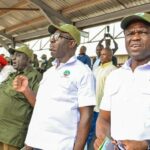
Political parties and candidates require resources to conduct campaigns, reach out to the electorate with their proposals for governance and run administrative costs of electioneering. For intra party contests, which transform aspirants for a position into a single candidate for a political party, resources will be required for the purpose of marketing an aspirant to become the choice of majority of the delegates or the whole electorate in indirect and direct primaries respectively.
However, the challenge is usually about the quantum and influence of resources, especially money in the determination of electoral outcomes. This is the background to the current debate on the large amount of money demanded by the ruling All Progressives Congress and the leading opposition party, the Peoples Democratic Party, for nomination forms and expression of interest to contest. This discourse reviews the large sums of money, the arguments in support, the position of the law and what should have been a more realistic position and the alternatives available to political parties in Nigeria.
The 2022 Electoral Act has increased the limits of candidate’s electoral expenditure and it now stands at N5 billion, N1 billion, N100 million, N70 million, N30 million and N5 million respectively for the presidency, governorship, senate, House of Representatives, state legislature and local government chairmanship and councillorship. But to qualify as a candidate, who can now spend up this limit in the main election, the aspirant has to scale the hurdle of being nominated by his party. The APC has fixed the sum of N2 million, N10 million, N20 million, N50 million and N100 million as the cost of expression of interest and nomination forms for state legislature, House of Representatives, senate, governorship and presidential aspirants respectively. On the other hand, the PDP has fixed N600,000 for state legislature, N2.5 million for House of Representatives, N3.5 million for senate, N21 million for governorship while the presidency attracts N41 million.
The argument of the political parties in support of these high fees is based on the need to weed out aspirants, who are not serious and simply want to cloud the electoral race by putting their names on ballot without the capacity, resources and standing to run for actual elections. They have also argued that this is an opportunity to raise resources for the administration of the party. The objective of the first argument can be achieved without demanding an arm and a leg from the aspirants. The aspirants can be asked to get endorsement from a few thousand members of the party to show that they are serious and known within party circles. On the second argument, there are several other means of raising money for the party beyond putting unnecessary hurdles on the constitutional right to contest in an election. Essentially, the two arguments cannot stand the test of reason. They are lazy arguments in naked support of monetisation of politics.
It is admitted that political parties are allowed by law to regulate their internal proceedings and procedures through their constitutions and rules provided they do not contradict the provisions of the 1999 Constitution or the Electoral Act. However, the intention of the legislature in allowing this internal jurisdiction cannot be the authority for political parties to charge huge expression of interest and nomination fees. These fees should have been token sums and should not be exclusionary, thereby starting the process of monetisation of politics from the very beginning.
It is imperative to recall that by the 2010 Electoral Act (S.91 (8), the legal framework before the 2022 Act: “In determining the total expenditure incurred in relation to the candidature of any person at any election, no account shall be taken of any deposit made by the candidate on his/her nomination in compliance with the law”. However, this provision was not reproduced in the 2022 Act. Candidates need to be reminded that in the current dispensation, these fees will be calculated as part of the election expenditure in determining whether a candidate has exceeded the allowed limitation.
The next stage after the expression of interest and nomination forms is the primaries; empirical evidence from monitoring of presidential and other political party primaries show that the aspirants bribe the delegates with various sums of money. The quantum of resources doled out by an aspirant is dependent on the depth of his/her pocket. In recent times, the bribes are paid in international currencies like the United States dollar. It is usually a bazaar and it seems like the highest bidder usually wins. The foundation of this bazaar is the huge expression of interest and purchase of forms fee. It is surprising that the Independent National Electoral Commission, the police and anti-corruption agencies have not raised an eyebrow about the huge exchange of money at party conventions and primaries when civil society organisations and journalists have severally reported on these bazaars.
It is a commendable practice when parties reduce or even remove the cost of nomination and expression of interest for disadvantaged groups such as women and people living with disabilities. But this is just the beginning of the process as it will not facilitate the emergence of women as candidates and elected officials due to the large volume of funds required to get to that level. Any person who cannot pay for forms and expressions of interest is not likely to have the huge resources which will be used to bribe delegates at the primaries.
A new political culture is imperative for Nigeria to begin the process of democratic consolidation. It is the culture that promotes popular participation in funding of campaigns and elections. The political parties should champion the new culture. Nigerians should no longer see aspirants and candidates as bags of money to be exploited. In more developed climes, citizens contribute money for their preferred aspirants and candidates. Small sums of money “contributed” by hundreds of thousands and millions of persons become tens and hundreds of millions used by candidates for running the costs of elections.
Candidates literally run a movement during the campaigns — a movement of believers and adherents to their philosophy of governance who want to see these ideas practised in their country. Some countries even provide for the tax-deductibility of contributions to candidates and political parties up to a reasonable limit specified by law. This recommendation was made to the National Assembly, which was of course ignored, in the run-up to the enactment of the new Electoral Act.
2023 provides Nigerians with the opportunity to severely diminish the influence of money in politics. Cash and carry politics has contributed in no small measure to the emergence of the dregs of society as leaders. We cannot afford to continue on that path.
Copyright PUNCH.
All rights reserved. This material, and other digital content on this website, may not be reproduced, published, broadcast, rewritten or redistributed in whole or in part without prior express written permission from PUNCH.
Contact: [email protected]





